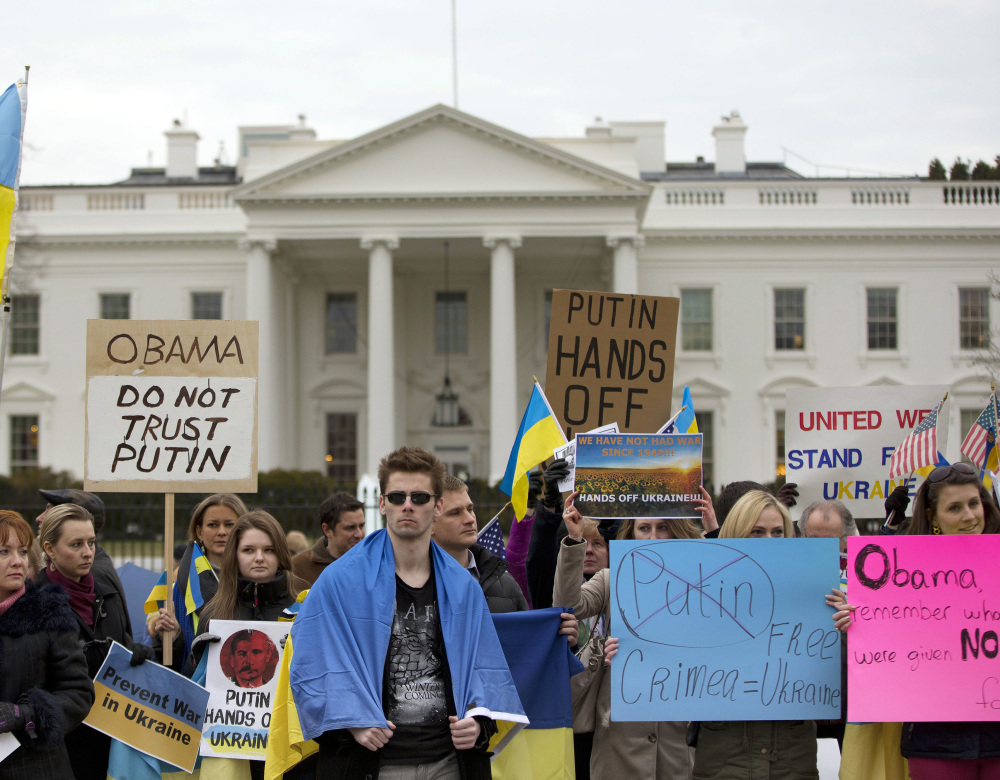BERLIN — Russian President Vladimir Putin’s threat to invade Ukraine poses one of the biggest dangers to regional security since the Berlin Wall fell. Analysts say there may not be much the West can do.
One day after President Obama warned Russia to stay out of Ukraine, Putin on Saturday sought and obtained unanimous approval from the Russian parliament for the right to send troops into the former Soviet republic. Ukraine said in response that an invasion would be an act of war.
“The world is on the verge of a conflict whose consequences we don’t yet realize,” Polish Prime Minister Donald Tusk, whose country borders Ukraine, said in an address to the nation Saturday. “This will be a moment of truth and will shape relations between countries in this region for decades.”
Putin is defying calls from Tusk, Obama and other leaders to show restraint as he moves to assert what he sees as Russia’s right to dominate the region just as the Soviet Union once did. While the West greeted the uprising that toppled Ukrainian President Viktor Yanukovych last week and pledged financial assistance to help the new interim government, Putin may be calculating that they won’t go much further than that.
“It’s now clear that if you embolden dictatorships like in Russia they will just keep going,” said Joerg Forbrig, a senior program officer at the Berlin bureau of the German Marshall Fund of the United States. “For the second time since Georgia in 2008, Russia is showing deeply aggressive behavior and Europeans are not able to handle it.”
PRACTICAL ISSUES
Putin is preparing the ground for a potential invasion of the southern Ukrainian region of Crimea and possibly other ethnic Russian regions after a string of disturbances in the aftermath of Yanukovych’s ouster. Putin told Obama in a phone conversation Saturday that he reserves the right to defend Russian speakers if they are threatened by violence.
For Europe and the United States, standing by would call into question their willingness to support allies in times of need, said Ian Bremmer, president of the Eurasia Group.
At the same time, there are practical issues to consider.
Russian help is needed in ongoing negotiations to resolve the Iranian nuclear issue and ending Syria’s civil war. Soviet- era pipelines in Ukraine carry about half of Russia’s gas shipments to Europe and Turkey.
Economic sanctions may be shrugged off by Putin, a former KGB agent who cares more about hard power and, as Forbrig said, “doesn’t have an economic mind.”
Obama also needs Putin to get troops and equipment home from Afghanistan because the United States depends on Russia for part of its Northern Distribution Network.
The network of supply routes “is of great value and it depends on Russia,” said Daniel Serwer of the Center for TransAtlantic Relations School of Advanced International Studies at Johns Hopkins University in Washington. “So do the nuclear talks with Iran. So what are we going to do about Russia? It’s a very gloomy picture, but I don’t know what we can do.”
Nor is Ukraine a member of the North Atlantic Treaty Organization or the European Union.
Serwer said the Obama administration “has come to understand that the Russians have already taken Crimea and there’s not much they can do about it.”
Ukrainians awoke Friday morning to news that unidentified troops, which Ukraine says are Russian, had taken control of airports in Crimea. That came after gunmen stormed the regional assembly and a pro-Russian was installed as prime minister.
STAKES HIGH
A U.S. official described events over the past days as an orchestrated series of steps that are intended to make Russian military intervention in Crimea appear legitimate.
For Putin, Ukraine offers an opportunity to assert his dominance in the region as he tries to restore the prestige Russia lost after the collapse of the Soviet Union, an event he’s described as the worst geopolitical disaster of the 20th century.
Still, Barbara von Ow-Freytag, who advised the German government from 2008 to 2013 on Russian issues, said there are three ways the West can respond to Putin that will hurt: freezing assets of Russian officials involved in the Ukraine intervention, imposing travel bans on them and canceling the planned Group of Eight Sochi summit in June.
“Putin loves putting on soft power shows like Sochi – the most expensive Olympics in history,” she said. “Staying away from the G-8 would be a slap in the face for him.”
The stakes are high as the United States and Europe consider how much Russian aggression they’re prepared to tolerate, Forbrig said.
“This is a Munich moment for the U.S. and Europe.”
Copy the Story LinkSend questions/comments to the editors.



Success. Please wait for the page to reload. If the page does not reload within 5 seconds, please refresh the page.
Enter your email and password to access comments.
Hi, to comment on stories you must . This profile is in addition to your subscription and website login.
Already have a commenting profile? .
Invalid username/password.
Please check your email to confirm and complete your registration.
Only subscribers are eligible to post comments. Please subscribe or login first for digital access. Here’s why.
Use the form below to reset your password. When you've submitted your account email, we will send an email with a reset code.